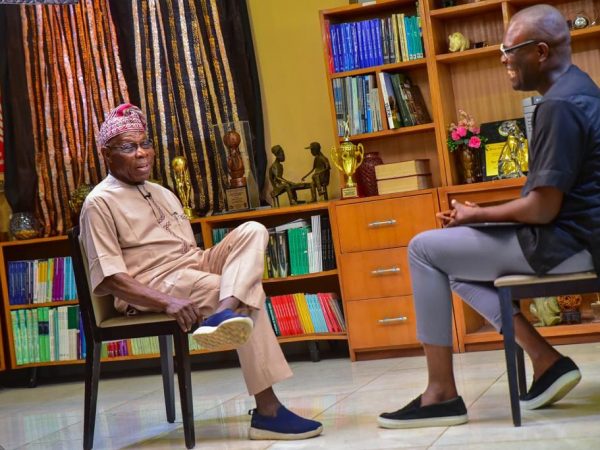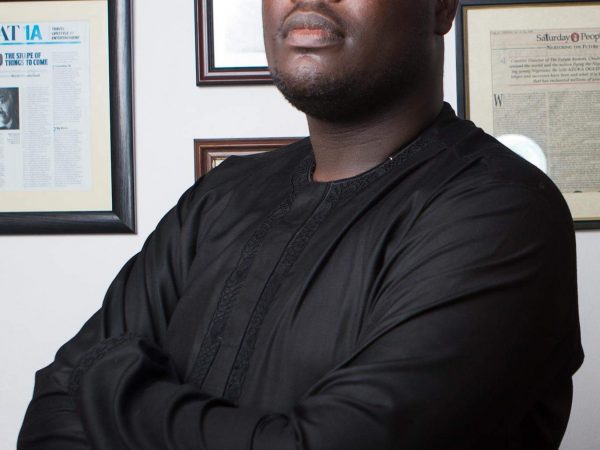To hear my mother tell the story of the Nigerian-Biafran civil war, is to listen to her talk of an accumulation of losses on the one hand and the resilience and creativity that saw herself and her young family through the war, on the other.
She often begins with the foresight she had to hire a van, while my obstinate father was away, to move the entire contents of their home, herself and my older siblings from Onitsha where they lived, to Osumenyi, our ancestral home.
When my father – who was sure that Onitsha wouldn’t fall – returned home to a bare house, he drove to Osumenyi in anger to bring his family back. My mother has always been the more stubborn of the two. My father ended up staying. Onitsha did fall. And my parents lost friends, a piano that nobody could play but which was a symbol of their rising middle-class life and whatever money they had because after the war, a deliberate policy to impoverish them saw Biafrans get only 20 pounds to start over again.
“Anyi bu ndi Igbo. We are resilient”
With the Indigenization Decree of 1972, two years after the war ended, there was further economic marginalisation of the Igbo (and other erstwhile Biafrans) when they could not buy into the companies the government was generously indigenizing. Whenever my mother tells the story of this war, and it does not matter to whom, it is not to complain.
She always ends with “Anyi bu ndi Igbo. We are resilient.”
As a child, I loved that word, ‘resilience,’ that quality that raised my parents and many like them from the ashes of Biafra into a Nigeria where they- despite everything- ran successful businesses, had fulfilling careers, raised families, thrived amongst the weeds. I thought of it as a solid, unshakeable, mountain of a trait. I took particular pride in that resilience I had grown up thinking of as endemic to us, Igbo, and in boarding school at FGGC Abuja, some of us Igbo girls (and there were not many of us) would give ourselves pep talks – when being so far away from home became almost too overwhelming for us that all we wanted to do was cry from homesickness – reminding ourselves that we were Igbo, we were resilient.
We did not cry, we persevered. Like our parents during the war.
“There was a Country”
Not too long ago was Biafran Memorial Day, and as part of my personal reflection on the day, I engaged with other Nigerians on social media and re-read parts of Chinua Achebe’s There was a Country. Both in my engagement on social media and in reading the book, I was struck again by how ‘resilience,’ in its many different guises, inserts its ubiquitous self into the Biafran narrative. In There Was a Country, the journalist, Pini Jason, interviews Yakubu Gowon, who was president of Nigeria from 1966 to 1975. Jason brings up the economic marginalisation of the Igbo in the years after the war and therefore their inability to buy into businesses under the Indigenization Decree.
Gowon responds by referencing the ‘ingenuity’ (read resilience) of the Igbo people. The Igbos, he insisted, by 1972 had “sufficient recovery …to participate (in the economic activities of Nigeria),” although they “were (probably) not able to buy into as many … such businesses as they would have desired.”
Gowon very perversely uses the resilience narrative which many disenfranchised Igbo like my parents (and people from other ethnicities that made up Biafra) employ to own their survival and admirable post war successes, to reject his government’s culpability in that economic disenfranchisement of a population of the country and to disavow the cruelty and injustice of the 20 pounds per family policy.
“Nigerians are resilient”
Over the years, my feeling towards ‘resilience’ has changed. I am both distrustful of it, and impatient with it, in the way we use it in Nigeria today to couch our apathy. We brag about it. Nigerians are resilient. We are so resilient; we are always happy! Resilience on its own, is an admirable feature, but it has come to imply an unwillingness to actively engage with and change our situation. Saying we are resilient can give us the illusion that that is all we ought to be. We bask in the glow of our saintly resilience rather than be agitators for a life where we are not called upon to prove our strength, our ability to survive terrible conditions every single day.
‘We are resilient’ has become the excuse we give for our supineness. It is the reason, in Fela’s words, we insist on “shuffering and shmiling.” It is why we do not complain or perhaps do not complain strategically/efficiently enough. It is why we do not get angry or at least let our anger fuel relevant actions. We are active on social media and have the discussions that we should be having on a wider platform, holding our politicians accountable, in our kitchens and bedrooms and beer parlours. And then, we put on our armor of resilience and become our own governments.
The Igbo say that one who does not know where the rain began to beat them cannot say where they dried their body.
A few years ago, my friend and Dutch journalist, Femke van Zeijl, who moved to Lagos noted that Nigerians do not wait for their government to provide amenities but take matters into their own hands. And she is right. Where there is no pipe borne water, citizens dig wells, where the power supply is erratic, citizens buy generators.
The proliferation of private schools is to make up for the poor quality of public schools, not to supplement them, likewise for private hospitals. When wealthy Nigerians throw parties that have to take their guests on bad roads, they tar the stretch of road that leads to their compounds or rent helicopters. The Nigerian citizenry is adept at finding its way around a government that does precious little for them.
The Igbo say that one who does not know where the rain began to beat them cannot say where they dried their body. Wherein lies the root of this particular Nigeran brand of resilience, this immolation of ourselves we celebrate? Perhaps, we pretend the government doesn’t exist because we do not perform our duties as citizens and our docility is an acknowledgment of this.
Where our western world counterparts might demand efficient governance from their leaders because their tax money funds the government, less than 30 % of Nigerians, according to a 2018 World Bank report, pay tax. Many of our successive governments return the favour by forgetting that we exist, except right before elections when votes are bought sometimes for something as inconsequential as a small, branded bag of rice. This, of course, has consequences.
“Failed state”
Nigeria is officially classified as a “failed state.” In 2019, it was ranked 14th most fragile state in the world (and 9th in Africa) on the Fragile States Index (formerly known as the Failed States Index). For a country on the cusp of greatness sixty years ago, the ranking is a terrible indictment on both our leaders and on the citizens.
Nowhere is this failure as visible and as devastating, in my opinion, as in the area of security. According to 2020 Global Conflict Tracker, since 2011- despite the president’s frequent claims of having defeated them – Boko Haram terrorist attacks have led to over 37,000 deaths, 2.5 million internally displaced people and 244,000 Nigerian refugees. And this in a democratic country that is not at war.
In addition to Boko Haram terrorism, kidnappings, abductions and Fulani Herdsmen’s attacks (and killings) have become the norm. If the primary attribute of home is a place of safety, then Nigeria has failed woefully in meeting its obligations to its citizens.
There are many diasporic Nigerians who do not want to return, not even on vacation, because they worry for their safety or for the safety of their families. It is normal, in today’s Nigeria, for our wealthy class to hire and arm their own police. There is a generation of Nigerian children – particularly those born at the beginning of the 21st century into affluent homes, who have no idea what it is to play, to ride their bikes, travel from one city to the next by road without the fear of being abducted or without a police escort or two shadowing them.
While the rich and the ruling elite can afford some level of security, those already marginalised by poverty or/and by their womanhood in a society that is both classist and patriarchal suffer at the hands of those sworn to protect them. The government’s inability or unwillingness to provide adequate security for its citizens should have made governance impossible for our government.
“Customary congratulatory messages”
The present administration ran on the promise of change, vowing to run a more efficient regime than the administration it succeeded under whose watch, 200 students were abducted from a girls’ school in Chibok. However, President Buhari has just celebrated his 5th year in office, complete with the customary congratulatory messages. And he is celebrating this in the middle of a global pandemic, in a country that has, according to 2015 report by McKinsey, about 120 ICU beds and where some university teaching hospitals do not have access to constant water supply and whose Ministry of Finance very unabashedly used their official twitter handle to beg a private US citizen, Elon Musk, for free ventilators.
The state of Nigerian hospitals has never been a priority for our leaders. Prior to the pandemic, Nigeria’s ruling elite and its wealthy class boosted medical tourism to India, Dubai, the US and parts of Europe, ignoring our grossly underfunded health care facilities. The First Lady, Aisha Buhari, very famously lamented in 2017 that the presidential clinic did not even have as much as a band aid. It was no surprise, therefore, to discover, during this pandemic, that it had no ventilator either.
The pandemic has also exposed the extent of Nigeria’s failure (in almost every other aspect). While in many parts of the world, access to running water (needed to fight the virus) is a given, many Nigerian communities are without this basic necessity; while in many countries, the lockdown was a minor inconvenience, for many Nigerians, it was the difference between earning money for food and not; between being stuck indoors with no electricity and not.
We saw videos of people breaking quarantine because it was impossible for them to not to do so. These were not people being deliberately pig headed, these were ordinarily law-abiding citizens who could not afford to stay home with no palliative intervention from the government. We saw a grown man strip himself in front of a camera because his car (which he used as a cab) was impounded for breaking lockdown rules. He lamented, “I get children, I get wife, na money I dey find, money to chop…You tell us to stay for home…no food.” It has most importantly, exposed the extent of our vulnerability and the limits of our resilience, as well as its ineffectiveness as a strategy.
“We have lived long enough with resilience”
This pandemic is perhaps the reality check that we, ordinary Nigerian citizens need to revisit our citizenship and decide how we want to exist moving forward. To replace our resilience with righteous anger, the sort of anger that leads to strategic complaints and therefore to revolutions and change. We have lived long enough with resilience (without works) as our default mode. Resiliency is for moments of adversity like war (and it is certainly not healthy for adversity to be normalised).
It is time to change the narrative and adopt a new normalcy where we no longer use ‘resilience’ to cover up both our own inadequacies and those of the government, where we do not seek to add value to what is simply our sufferhead by terming it resilience. What should be normalised is a society where elections are taken more seriously than it is now, with competent women and men being voted in; where elected officials do the jobs for which they have been elected or are voted out; where citizens are not content with being their own mini governments, providing for themselves to the extent that they can, the services their governments should.
The normalcy we should aim for is one where our voices are empowered by our being better citizens so that the steady decline of our nation is arrested and the promise it showed in the early years of independence is fulfilled.
The full series is available as part of a special print edition of The Africa Report magazine: ‘Where is Nigeria (really) heading?’



